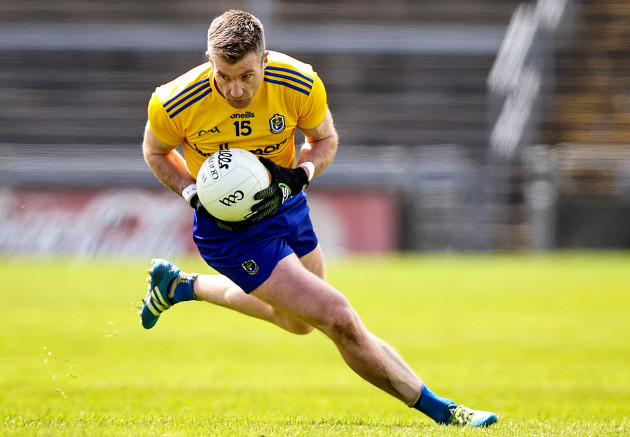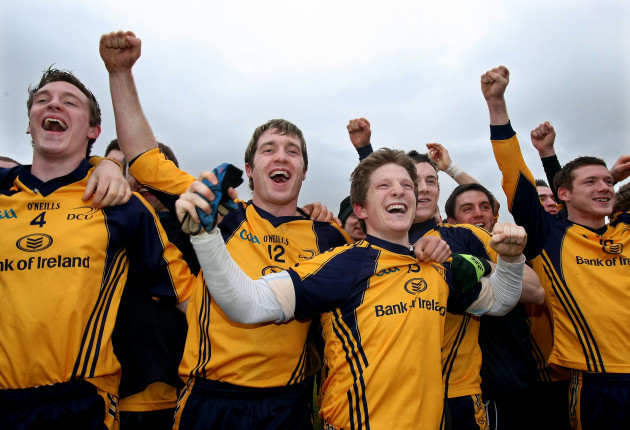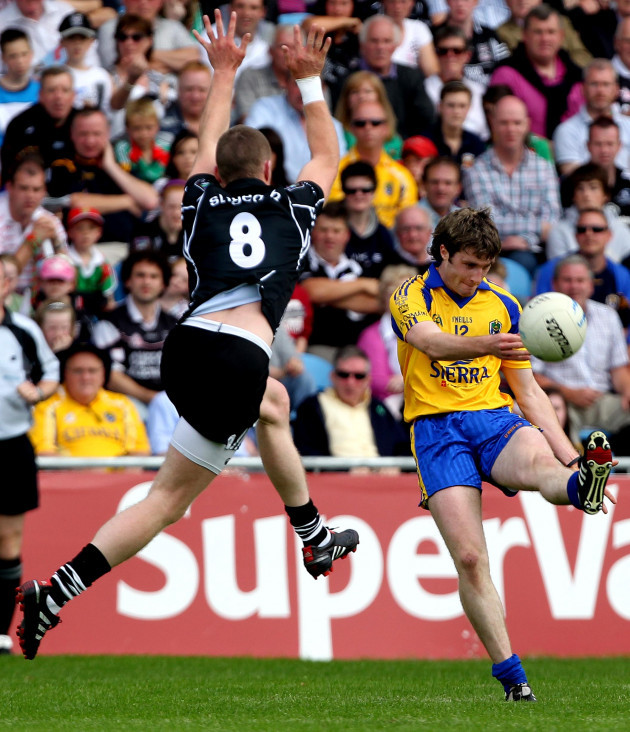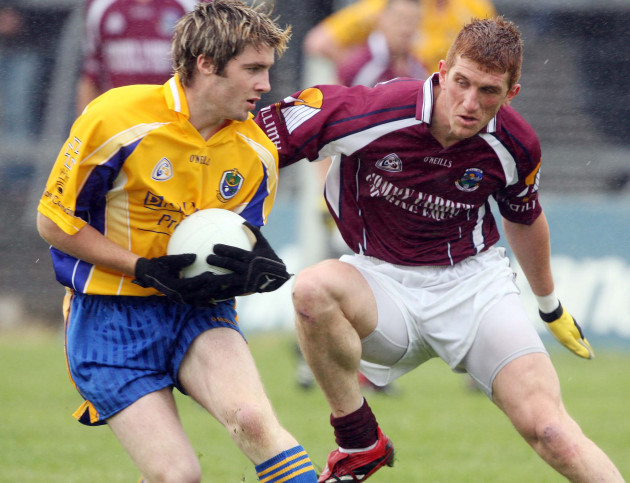HE EXITED THE stage 16 years after he debuted as a teenager in New York, bringing the curtain down on one of the longest inter-county careers of recent times.
Cathal Cregg reflects on his Roscommon days with a sense of gratitude, balking at the suggestion that playing football at the top level was ever a chore.
Sure, he played on Roscommon’s most successful team since the late 1980s and enjoyed plenty of great moments on the field, but for Cregg county football was a lifestyle. And one he was more than happy to adopt.
“I don’t really get this thing where you’d hear players saying that it’s not enjoyable or whatever,” he tells The42. ”Ultimately I wouldn’t have been doing it if I didn’t enjoy it.
“I can’t understand why an amateur player would go and play if they don’t enjoy something, there’s no one making them do it. I’d have enjoyed all the trainings. Obviously, I was lucky enough I was on a couple of trips.
“I was able to go to Australia, America and a few bits and pieces. They’re probably the highlights, they’re brilliant craic when you’re out with a group of players for a week or two at a time.
“But all the other stuff in between, I’d generally enjoy training a couple of nights a week, doing the gym work, competing in games and so on. I enjoyed that whole scene.”
Maybe his name wasn’t quite up in lights like recently retired Dublin greats Philly McMahon and Kevin McManamon, but for a player lining out for a county outside of the handful of All-Ireland contenders he enjoyed a very good innings.
He won two Connacht medals, three Division 2 titles and a Division 3 crown with the Rossies. He toured Australia with Ireland in the 2014 International Rules, and won a Sigerson Cup with DCU in 2010.
He took a year out to focus on his PhD 2017, a year when Roscommon also prevailed in Connacht. Though he’s satisfied to have been part of two provincial title winning sides, it’s hardly surprising given his competitive nature that Cregg feels there were other opportunities missed along the way. He points out three final defeats in particular that stand out.
“You’d always want more but it was quite a successful period,” he says. “I’d be definitely saying we should have won more. In 2011 we should have won one but we lost to Mayo by two points late on in the game.
“In 2016 we drew with Galway, lost the replay. In 2018 we’d a good chance to beat Galway as well, so they were a couple of years when we were very close to winning. Probably from 2016-19 we could have won a good few in a row, that was probably when the team was it its peak.
“You’ll always be disappointed we didn’t win more. Ultimately we never pushed on to an All-Ireland semi-final or final which I always felt we were good enough to do but for various reasons it didn’t happen. There’s a small group of teams at that top level and it’s hard to make that breakthrough at times.”
In the final six years of Cregg’s career, Roscommon could consider themselves a top eight county, though they struggled to retain their place in Division 1. Between 2015 and 2021, they were promoted from Division 2 three times and relegated from the top flight on three occasions.
In 2016 under Kevin McStay they targetted a strong league campaign and reached the Division 1 semi-finals, losing to Kerry. Perhaps that led to them running out of steam in the summer, when they suffered a heavy Connacht final replay to Galway and lost to Clare in the qualifiers.
“We probably needed to consolidate our Division 1 status which we ultimately never done. We had a very good league campaign in 2016 and got to a league semi-final where Kerry beat us.
“Then the following year we went down and we probably needed to stay up that year realistically. We went back up in ’18, down in ’19. Very unlucky actually to go down in ’19 (relegated by a point).
“But then Division 1 games are where you need to be playing to be competing, even for provincial titles especially in Connacht because you’ve Galway and Mayo.
“They were two good Division 1 teams over the last number of years. That’s where you have to be competing because they’re like championship games. You get away with stuff in Division 2 that you don’t get away with in Division 1.
“I played in all four divisions and the bar raises as you go through every single division but there’s no doubt that Division 1 is a jump ahead of any of the rest of them.”
He worked with several big name managers over the course of his career, McStay included. John Evans “made very good strides” with the county at the beginning of the last decade, while Fergie O’Donnell, Anthony Cunningham and John Maughan also donned the bainisteoir bib.
“They’re all very different people and characters,” he remarks. “I suppose it’s hard to compare because they got the team at very different stages.
“Me as a player I’m very different now to what I was when I was 18 or 19, even in terms of my application and everything. Also the team, we won the Connacht final in 2010, we dipped for a while and then we went from Division 4 to Division 1 and there was a whole new raft of different players and talent came through.”
The game changed greatly over the years too. Cregg arrived onto the scene when strength and conditioning was beginning to become widespread, whereas it’s a key component of any set-up now.
“Early on in my career we’d have trained every bit as hard as we train now,” he says.
“Maybe the lifestyle around it has changed a lot now, but the big thing really is the evolution of tactics. That time it was very much still the 15-on-15 type thing whereas it has evolved into a period there where it was completely defensive.
“It seems to have gone a bit more transition type play now, moving the ball at speed whether it’s through the foot or carrying the ball. The tactical side of things is the big thing that’s come on in the last 10 years, whether that’s a good thing or bad thing I’m not sure.”
Despite the defensive era, he scored 4-48 in 51 championship appearances and posted 19 goals in competitive games since 2010.
Cregg’s burning pace contributed to many memorable moments, not least his goal in the 2019 Connacht semi-final when he left Keith Higgins, of all people, trailing in his wake after a powerful run.
Cathal Cregg opens up Roscommon's scoring with a terrific goal! pic.twitter.com/qqwwiFk2l4
— The GAA (@officialgaa) May 25, 2019
He is employed as the provincial games manager in Connacht and has a strong background in S&C, having completed a PhD to augment his Masters in Exercise Science in recent years.
His S&C studies helped him with his on-field performances and while it appeared from the eye-test that Cregg never lost his pace even into his mid-30s, the science backed that up too.
“My times through the GPS systems would have pretty much stayed at the same the whole way through. It’s something I’d have worked on even up until the season gone by, I’d have been quite high on that so I was lucky enough on that obviously.
“But it’s something I’d have worked on, doing sprint training, gym work and running technique.
“If you look at the research, speed and power will start to decline towards the mid to late 30s but that’s probably more so if you’re sitting at home doing nothing type of thing.
“But if you’re training with an inter-county team you should be doing your gym work and speed work a couple of times a week just through your training alone so there’s no reason why you shouldn’t be able to maintain it.
“Bar injuries or something affecting it. I think people think that players should stop playing once they get to 30, that they nearly fall apart. But if lads look after themselves that shouldn’t be the case.”
The42 is on Instagram! Tap the button below on your phone to follow us!




